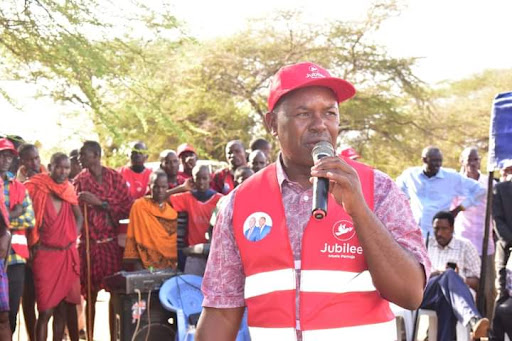
ODM and the Jubilee Party have identified their Kajiado candidates, while the United Democratic Alliance party is yet to conduct nominations.
As the governor's race begins in earnest, aspirants and candidates are reaching out to all major tribes.
At stake are the 411,193 registered voters in 797 polling stations across the five subcounties of South, West, North, Central, and East, which are also constituencies.
The registered number of voters is provided based on the 2017 IEBC statistics but latest numbers from mass registrations are expected to be higher.
Major tribes in Kajiado are the dominant Maasai voters (147,000), Kikuyu (125,023), Kamba (48268), Kisii (24,689), Luo (20,296) and Luhya (20,062).
Others are Kalenjin (8,056), Ameru (6,769), Somali (4,946), Taita (1,480), Mijikenda (963), Kuria (268) and others.
The Maasai are spread across the region and concentrated in the reserves.
The second-largest Kikuyu community is mainly concentrated in urban areas of Kajiado North, South, East and Central constituencies.
The other communities are doing business in all major towns and owning land property in rural areas.

The IEBC has reported registered voters per ward in five constituencies:
Kajiado North
Total: 127,953. Olkeri 30,292; Ongata Rongai 26,384; Nkaimurunya 32,274; Oloolua 18,005; Ngong 20,998
Kajiado Central
Total 56,434. Purko 3,668; Ildamat 8,016; Dalalekutuk 14,309; Matapato North 15,003; Matapato South 15,438.
Kajiado East
Total 102,804. Kaputiei North 19,942; Kitengela 36,831; Oloosirkon/Sholinke 28,244; Kenyawa Poka 9,812; Imaroro 7,975.
Kajiado West
Total 64,026. Keek-Onyokie 28,019; Iloodokilani 7,885; Magadi 9,853; Ewuaso Oonkidong’i 14,881; Mosiro 3,388.
Kajiado South
Total 59,976. Entonet/Lenkisim 10,386; Imbirrikani/Eselenkei 8,504; Kuku 15,972; Rombo 15,489; Kimana 9,616.
The county's top seat is contested by former Governor David Nkedianye of Jubilee, incumbent Governor Joseph Lenku of ODM and a UDA candidate yet to be nominated.
Those in UDA are MPs Peris Tobiko of Kajiado East, Katoo ole Metito (South) and former NTSA boss Francis Meja.
The three candidates, like Nkedianye, come from the Red Cows clan (Odomong’i), while Lenku is alone in the Black Cows clan (Orokiteng’).
Over the years, the two clans have been competing and all the elected MPs in Kajiado, except in Kajiado North, are from the Red Cows Odomong’i clan.
Stakes are higher for the Kikuyu community after former Governor Nkedianye picked one of their own, MP Joseph Manje, as his running mate.
Lenku and Nkedianye have been tested as governors and the electorate will be comparing they performed while in office.
Lenku's term has been dogged by problems. They include the collapse of the Sh120 million Paai bridge, blackouts in all major towns for five years for non-payment of bills and lack of drugs in county hospitals throughout his entire term.
The governor has said the National Treasury has not released resources in time.
Salaries have not been paid on time for the past five years. Some have been delayed for as long as four months. Doctors and nurses have complained of failure by the county government to motivate them.
When Nkedianye was governor, the county received an annual budget of Sh5 billion and when Lenku was elected, the budget was raised to more than Sh10 billion.
Even with the unlimited flow of water on the Nol-Turesh River, whose source is Mt Kilimanjaro in Kajiado South, the people of Loitokitok still depend on salty water from local boreholes. Others travel with carts to Tanzania.
Before Lenku took over as governor, Kitengela town received fresh water from EPZA in the Athi River, while Loitokitok, Emali, Sultan Hamud and Machakos towns had fresh water from the Nol-Turesh River.
All these towns depend on salty water from private boreholes.
Kajiado and Isinya towns depend on borehole water, 10 years after devolution.
Experts say water from Nol-Turesh if harnessed, would supply the counties of Kajiado, Machakos, Nairobi, and Kiambu.
Excess water could be pumped to Amboseli National Park for the wildlife.
Kajiado's natural resources include construction stones from the Nkurrunka area of Kitengela, Magadi soda ash from Lake Magadi, sand, gypsum, limestone and salt.
Gypsum, which is used in cement, paint, and fertilisers, is mined at Isinya and limestone is found in Kibini, Toroka, and Ng'atataek.
With all these resources, the county has nothing to show for its riches. Rural roads are in bad shape, while the county government collects more than Sh4 million cess tax from sand and building stones transporters.
Kajiado will be deciding on whose hand at the helm will start development rolling against after it stopped five years ago.
Other than the Maa community that will, as usual, vote for their clansmen, other communities are expected to change the equation and say no to tribal leaders who will not help them after the election.
(Edited by V. Graham)
“WATCH: The latest videos from the Star”
 © The Star 2024. All rights reserved
© The Star 2024. All rights reserved